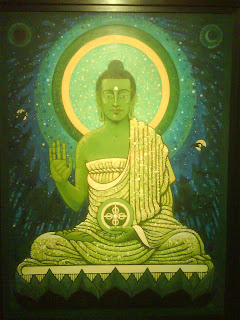
"The Buddhas, therefore, or the state of Buddhahood, represent the highest reality, and those who want to realize it, have to follow the example of the Buddhas: the Boddhisattva-Path, in which there is no place for escapism, no running away from discomfort and suffering, but, on the contrary, the recognition, the understanding and acceptance of the fact that perfect enlightenment cannot be attained without the readiness to take upon oneself the suffering of the world."
"...To take upon oneself the suffering of the world, does not mean that one should seek suffering, or that one should glorify it, or inflict it upon oneself as penance, like certain ascetics among Hundus and Christians. This is an extreme, which should be avoided as much as the over-emphasis of our own well-being. The Buddhist attitude flows from the inner urge to identify oneself with all living and suffering beings. This attitude does not only prevent us from laying too much stress on our own suffering- which would only strengthen our ego-consciousness- but it actually helps us to overcome it and minimize our own suffering."
"...[the Buddha] knew that only by going through the purifying fires of suffering can one attain the highest enlightenment and become fit to serve the world. His way was not to escape suffering, but to conquer it (this is why the Buddhas are called "Jinas" or 'Conquerers'), to overcome suffering by facing it bravely and seeing it not only as a personal affliction but in its totality, as the common fate of all living beings.
It is in this spirit that the Bodhisattva's vow is taken by all those who want to follow the sacred path of the Buddhas: 'I take upon myself the burden of all suffering, I am determined to endure it. I do not turn back, I do not flee, neither do I tremble. I fear not, I yield not, neither do I hesitate. -And why? -Because the deliverance of all beings is my vow... I am working for the establishment of the incomparable realm of knowlege among all beings. I am not only concerned with my own salvation. All these beings must be rescued by me from the ocean of samsara by the vessel of perfect knowledge.'
"The attainment of this state of salvation implies the overcoming of all narrow individual limitations and recognition of super-individual realities within one's own mind. It is the most universal experience the human mind can attain, and from the very outset it demands a universal attitude; for he who strives for his own salvation, or merely with a view of getting rid of suffering in the shortest posssible way, without regard for his fellow-beings, has already deprived himself of the most essential means for the realization of his aim.
"Whether it is objectively possible to liberate the whole world is beside the point- firstly, because there is no such thing as an 'objective' world for the Buddhist, since we can only speak of the world of our experience, which cannot be separated from the experiencing subject; secondly, the state of enlightenment is no temporal state, but an experience of a higher dimension, beyond the realm of time."
"It is in the very nature of enlightenment that it tolerates no exclusiveness (which, indeed, is the root of all suffering), neither on the way towards its realization, nor after its attainment - because it radiates without limits and without exhausting itself, allowing others to participate in it - like the sun which gives its light without restriction to all who have eyes to see and sensitiveness to feel its warmth, or organs to absorb its life-giving forces.
And just as the sun, while illuminating the universe impartially, acts in different ways upon different beings, in accordance with their own receptivity and qualities, so the Enlightened One - though he embraces all living beings without distinction in his mind - knows that not all can be liberated at the same time, but that the seed of enlightenment, which he is sowing, will bear fruit sooner or later according to the readiness and maturity of each individual.
But since to an Enlightened One time is as illusory as space, he anticipates in the supreme experience of enlightenment the liberation of all. This is the universality of Buddhahood and the fulfillment of the Boddhisattva-vow through the 'Wisdom which accomplishes all works', the Wisdom of Amoghasiddhi.
This All-Accomplishing Wisdom consists in the sythesis of heart and mind, in the union of all-embracing love and deepest knowledge, in the complete self-surrender to the highest ideal of human striving, which finds the force for its realization in the fearless acceptance of life's sufferings. For fearlessness is the gesture of Amoghasiddhi.
He who, inspired by this attitude, takes upon himself the Boddhisattva-vow at the feet of the Buddha, in the eternal presence of all the Enlightened Ones, may remember Tagore's deep-felt words:
'Let me not pray to be sheltered from dangers
but to be fearless in facing them.
Let me not beg for the stilling of my pain
but for the heart to conquer it.
Let me not look for allies in life's battlefield
but to my own strength.
Let me not crave in anxious fear to be saved
but hope for patience to win my freedom.'
SARVAMANGALAM!
Blessings to ALL!"
(Lama Anagarika Govinda, "Foundations of Tibetan Mysticism," pp.277-280)